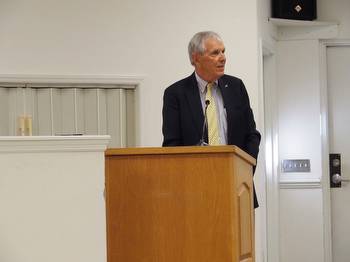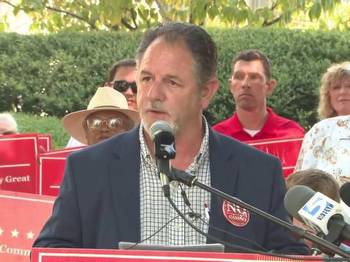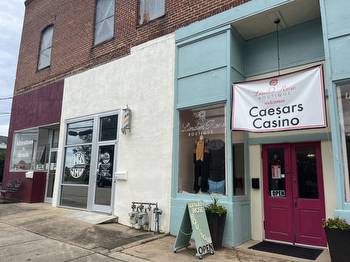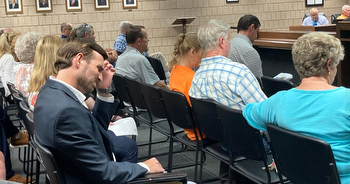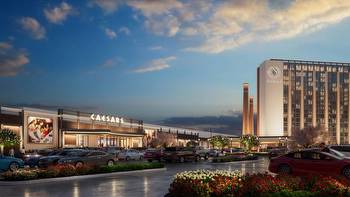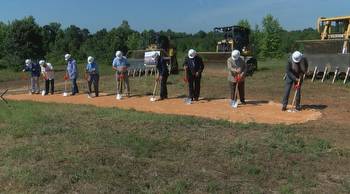North Carolina casino legislation: Winners and losers

Much of the news emanating from North Carolina this last year revolved around online sports betting. But a recent draft casino bill circulating among legislators in the Tar Heel state has gained some support.
The bill has the potential to disrupt fledgling casino developments in Virginia, especially Caesars Virginia in Danville. It also potentially puts pressure on tribal casinos located in the western portion of the state, threatening gaming revenue rumoured to approach $1bn.
The bill calls for the development of four Class III casinos, one of which is assigned to the Lumbee Tribe for casino development in the eastern portion of the state. The remaining three casinos would be operated by the single entity that wins the bid.
The language in the draft bill (below) essentially limits the development of the three commercial casinos to Rockingham, Anson and Nash counties.
A site that is located in a county that (i) is a development tier one area, as defined in GS 143B-437.08 for the 2022 calendar year, (ii) has a majority of its land area within 60 miles of an international airport, (iii) is east of counties traversed by Interstate 77, (iv) does not contain Indian lands with gaming as of 1 July 2023, (v) is either a border county or a county traversed by Interstate 95, (vi) has a population of less than 100,000 as of the most recent federal decennial census at the time the application is made, and vii) is not in a county listed in GS 14-292.4(c)(5).
The bill requires entertainment districts to be developed along with the casino in each of the three locations. The stated goal is to increase tourism and rural economic development. There’s a vision of retail, hotels, entertainment, residential and commercial and industrial developments.
The competing bidders would have to invest a minimum of $1.5bn and meet employment targets at each location. Not surprisingly, given the requirement and locations, this is titled as a Rural Tourism Incentive Programme designed to increase employment and economic development in rural counties.
A glance at the map shows just how significant these locations could be.
The most obvious impact will be on Caesars Virginia in Danville, straddling the border between Virginia and North Carolina. Caesars, in partnership with the Eastern Band of Cherokee, opened a temporary casino on 15 May 2023. The permanent casino is slated to open in 2024.
It is planned to include a casino, a 500-room hotel, meeting rooms and conference centre and a 2,500-seat entertainment venue. The casino will feature 1,300 slot machines, 85 table games, a poker room and a sportsbook.
Built in Virginia, made in North Carolina
Caesars Virginia expects to draw a significant portion of its guests from the Winston-Salem, Durham and Raleigh metropolitan areas. More than 50% of revenue is likely to come from North Carolina residents.
The inclusion of Rockingham in the shortlist of three counties is a direct response to the Danville casino, located to provide an intervening opportunity and closer gaming venue for players in these cities.
With the right operator and the development of an entertainment district, a property in Rockingham County would present a powerful competitor to Danville. It could even provide an alternative for residents in southern Virginia.
The resultant market for Caesars Virginia (estimated to be approximately $400m) could shrink significantly, by as much as 45%-50%. Expenses would rise due to increased competition.
The Nash County site is approximately 40 miles east of Raleigh-Durham. While not in an intercept location like Rockingham County, it does provide an alternative closer to the metropolitan area than the Danville casino. This will intensify the battle for market share with Caesars Virginia.
The Anson County site is approximately 35-45 miles east of Charlotte. It would offer an alternative to the Catawba Two Kings Casino Resort, 30 miles west of Charlotte. That casino is currently in a temporary structure. Plans to develop a permanent casino costing $273m featuring a 1,500-room hotel, entertainment centre, restaurants, shops and a casino with 1,796 slot machines and 54 table games are currently on hold due to infractions of the Indian Gaming Regulatory Act.
The Charlotte market is large enough to support two casinos, especially if gamers from Atlanta can be induced to visit. However, the announcement of a commercial venture increases uncertainty surrounding the timing and scope of the tribal development.
Further ripple effects of North Carolina’s casino plans
The impact on Harrah’s Cherokee properties is likely to be small but noticeable (less than 10%). North Carolina residents in the more populous central and eastern portions of the state would now have viable and more proximate alternatives.
The Hard Rock Bristol property in Virginia is more of a local draw and is 120 miles away from the proposed North Carolina locations. Therefore, it’s unlikely to see much of an impact.
State senate leader Phil Berger suggested as much as $259m is being siphoned out of North Carolina towards the Danville casino. He seeks a solution to “stem the tide” of revenue and jobs flowing to Virginia.
This harks back to the arguments made between 1990 and 2020, when casino legalisation in one state prompted development plans in another in a domino effect. Land-based casinos spread rapidly throughout the US as a result.
With the passage of mobile sports betting in 2023 and that market likely to launch in 2024, land-based casinos could shuffle the competitive process to obtain one of the 12 sportsbook licences. Operators active in both verticals, of course, would realise bigger returns. These new properties will likely gain rights to offer retail betting.
The costs of casino expansion in North Carolina
There is a hefty licence fee of $25m, although a 22.5% GGR tax seems reasonable. This is substantially more than the 6% tribes pay to the state but it compares well to other states.
Coupled with a relative dearth of new gaming opportunities in the land-based sector, competition for licences could be intense.
However, the requirement to invest $1.5bn in the three sites and develop entertainment districts while committing to creating 5,250 jobs will limit prospective operators to those better capitalised. Businesses with broader development experience or partners experienced in non-gaming developments will be well positioned.
The Cordish Companies, with its established Live! brand, has the gaming and non-gaming development chops to address the three projects. Their lobbyists have been active in support of the legislation.
It’s worth considering the unusual bundling of three projects is designed to attract an operator with the experience, brand recognition and financial muscle to take on the Eastern Band of Cherokees and Caesars.
This suggests major gaming companies such as MGM, Penn, Wynn and Bally’s would be well positioned to respond. Even though this could be viewed as competitive with the Cherokees there are also a few tribes with the track record and wherewithal to compete on a commercial basis.
There are the Seminoles with Hard Rock, Mohegan Gaming and Entertainment and the Poarch Creek Band of Potawatomi Indians. Tribes with a lower profile for off-reservation developments could also emerge as potential bidders.
The Lumbee Tribe’s fight for federal recognition
The fourth casino is set aside for the Lumbee Tribe in the southeastern part of the state – even if it fails to gain federal recognition.
The tribe’s battle to obtain that recognition, and with it the rights to develop a casino, has a long history. The lack of recognition is seen by many, including local politicians, as an issue that needs correcting.
The proposed bill recognises this by setting aside 10 counties in the southeastern portion of the state where the Lumbees could develop a casino.
This development, if it progresses, could have implications for igaming. A major land-based commercial casino operator allied with an online betting operator would intensify lobbying for icasino down the road.
That effort may be years away. But a renewed push to legalise igaming in neighbouring states coupled with disillusionment over low sportsbook tax take could bring it closer.
At the time of writing there has been no movement on the bill. There is reportedly broad legislative support while lobbyists from gaming operators (such as Cordish) are expressing interest.
It may take a year or two for this proposal to mature. But the growing flow of North Carolinians to Virginia will provide sufficient impetus for this to remain a hot issue over the next few years. The allure of tax revenues and economic development will reinforce this.
The winners, should this pass, will be the residents of the host counties, the Lumbee Tribal Nation, and North Carolina. All would benefit from the economic development and tax revenue.
The winning operator would also benefit as GGR estimates for the three properties exceed $1.2bn.
On the losing side would be Caesars and the Eastern Band of Cherokees, and their project in Danville. The Catawba Nation and their Two Kings property west of Charlotte, meanwhile, would see its potential market shrink.










